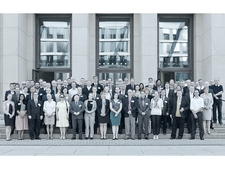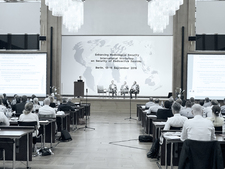-
Topics
subnavigation
Topics
Electromagnetic fields
- What are electromagnetic fields?
- Static and low-frequency fields
- Radiation protection relating to the expansion of the national grid
- High-frequency fields
- Radiation protection in mobile communication
Optical radiation
Ionising radiation
- What is ionising radiation?
- Radioactivity in the environment
- Applications in medicine
- Applications in daily life and in technology
- Radioactive radiation sources in Germany
- International Workshop on the security of sealed radioactive sources
- Register high-level radioactive radiation sources
- Type approval procedure pursuant to RöV and StrlSchV
- Cabin luggage security checks
- Radioactive materials in watches
- Ionisation smoke detectors (ISM)
- Radioactive radiation sources in Germany
- Effects
- What are the effects of radiation?
- Effects of selected radioactive materials
- Consequences of a radiation accident
- Cancer and leukaemia
- Genetic radiation effects
- Individual radiosensitivity
- Epidemiology of radiation-induced diseases
- Ionising radiation: positive effects?
- Risk estimation and assessment
- Radiation protection
- Nuclear accident management
- Service offers
-
The BfS
subnavigation
The BfS
- About us
- Science and research
- Laws and regulations
- BfS Topics in the Bundestag
- Links
Outcome of the International Workshop on the Security of Sealed Radioactive Sources in Berlin
Radioactive sources are used for many applications in medicine, industry, research and education throughout the world. Due to increasing globalisation and the worldwide distribution of radioactive sources, however, there is also an increased potential for criminal or terrorist activities, which means that the security of radioactive sources is highly important.
The BfS organized the "International Workshop on the Security of Sealed Radioactive Sources" held from 13 - 15 September 2016 in Berlin on behalf of the Federal Ministry for the Environment, Nature Conservation, Building and Nuclear Safety (BMUB) and the Federal Foreign Office (AA). The workshop was attended by 79 experts from 19 countries. The participants included representatives of German and international authorities (among others, Federal Foreign Office (AA), Federal Ministry for the Environment, Nature Conservation, Building and Nuclear Safety (BMUB), BfS, Federal Office for Economic Affairs and Export Control (BAFA), U.S. Nuclear Regulatory Commission (USNRC), U.S. Department of Energy (USDOE), representatives of international organisations and initiatives (among others IAEA, Global Threat Reduction Initiative (GTRI)) as well as individuals handling radiation sources (e.g. manufacturers, users of national importance).
Focus of interest: Code of Conduct on the Safety and Security of Radioactive Sources (CoC)
The issues discussed at the workshop were:
- Are the existing international standards and the framework for the safety and security of radioactive sources sufficient?
- Are the standards and framework being implemented effectively in the various regions of the world?
The focus was on the Code of Conduct on the Safety and Security of Radioactive Sources (CoC) of the International Atomic Energy Agency (IAEA) whose recommendations are considered an important foundation for global efforts concerning the security of radioactive sources.
Way of dealing with the recommendations of the CoC compared internationally
In the workshop, the participants reported about the situation concerning the security of radioactive sources in their respective countries and presented their approaches to establish a national regulatory infrastructure.
The recommendations on the security of radioactive sources laid down in the CoC as well as in the supplementary Guidance on the Import and Export of Radioactive Sources were verified for global validity and completeness and evaluated from individual national perspectives.
At the workshop, the following topics were discussed in particular:
- control throughout a source's entire life cycle,
- education and training of all stakeholders in proportion to their responsibilities,
- international support in the national threat assessment process,
- establishing resp. improving security culture,
- problems arising from international trade in radioactive sources,
- dealing with orphan radioactive sources,
- management of disused radioactive sources,
- interface between security and safety.
In addition to the CoC, also other international standards such as the Joint Convention on the Safety of Spent Fuel Management and on the Safety of Radioactive Waste Management, the European Directive 2013/59/Euratom, the international Basic Safety Standards GSR Part 3 as well as security standards such as IAEA NSS 11 and NSS 14 were considered in the discussion.
Implementing the security requirements of the CoC on a global scale
The participants reached consensus that the CoC is a comprehensive and flexibly adaptable document, which is rich in detail and fully serves its purpose. The proposal brought forward by several states beforehand to turn the CoC into a Joint Convention was not considered necessary by the majority of the participants.
However, they called for intensifying the worldwide efforts to implement the security requirements proposed in the CoC and for consistent reporting.
Topics not fully covered by the CoC
Moreover, participants identified topics not fully covered by the CoC:
- security in the transport of radioactive sources,
- measures relating to insider threat,
- appropriate measures in response to security threats,
- use of alternative, non-isotope technologies,
- establishment of an adequate security culture at all levels (top down and bottom up).
Strengthening the global significance of the IAEA
The participants emphasised the IAEA's central global significance and suggested to further enhance its role.
In particular, the following suggestions for initiatives of the IAEA were made:
- produce a compilation of relevant documents available on the internet and issued by the member states on the regulations for the secure handling of radioactive sources (e.g. national legislation, guidelines),
- propagate and promote security culture,
- include experience from the safety and security requirements of other industrial sectors (e.g. aviation),
- adopt and disseminate the already negotiated Guidance on the Management of Disused Radioactive Sources supplementary to the CoC,
- promote self-assessment at user level.

![]() Participants of the International Workshop on the Security of Sealed Radioactive Sources held from 13 - 15 September 2016 in Berlin
Participants of the International Workshop on the Security of Sealed Radioactive Sources held from 13 - 15 September 2016 in Berlin
Important for the future: safety awareness and security culture
In the final document, the following topics were highlighted as especially relevant for future development:
- create security awareness and improve security culture at all levels,
- promote international exchanges of experience through reporting and information systems, particularly on threat analyses and practical questions concerning security,
- promote education, training and the motivation of experts,
- draft suitable measures in response to security threats,
- take into account the importance of information security (cyber security),
- promote exchange of information between users and producers,
- create a national strategy for dealing with disused radiation sources,
- adopt Guidance on the Management of Disused Radiation Sources as a supplementary guidance to the CoC,
- develop national threat analyses as well, if necessary establish international exchange of experience,
- intensify education and training of experts and users, especially with regard to questions concerning security,
- promote existing international working groups (e.g. working group on radioactive source security (WGRSS) of the IAEA) as well as, if necessary establish other working groups on the topic.
The participants welcomed the intensive and fruitful discussions during the workshop and recommended to intensify the exchange of experience at further expert meetings in future.
State of 2017.10.27



